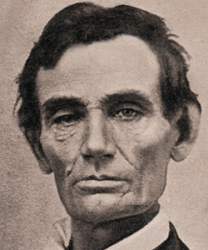Record Data
Source citation
Abraham Lincoln to Lyman Trumbull, December 11, 1858, Springfield, IL, in Gilbert Avery Tracy, compiler, Uncollected Letters of Abraham Lincoln (Boston, MA: Houghton, Mifflin & Co., 1917), 264.
Type
Letter
Date Certainty
Exact
Transcriber
Transcription adapted from the Uncollected Letters of Abraham Lincoln (1917), compiled by Gilbert Avery Tracy
Adapted by Michael Blake, Dickinson College
Transcription date
Transcription
The following transcript has been adapted from Uncollected Letters of Abraham Lincoln (1917).
To Lyman Trumbull
Springfield, Dec. 11, 1858.
Hon. L. Trumbull.
My dear Sir: Your letter of the 7th enclosing one from Mr. Underwood is received. I have not the slightest thought of being a candidate for Congress in this District. I am not spoken of in the connection; and I can scarcely conceive what has misled Mr. Underwood in regard to the matter.
As to what we shall do, the Republicans are a little divided. The Danites say if we will stand out of the way, they will run a man, and divide the democratic forces with the Douglasites; and some of our friends are in favor of this course. Others think such a course would demoralize us, and hurt us in the future; and they, of course, are in favor of running a man of our own at all events. This latter view will probably prevail.
Since you left, Douglas has gone South, making characteristic speeches, and seeking to reinstate himself in that section. The majority of the democratic politicians of the nation mean to kill him; but I doubt whether they will adopt the aptest way to do it. Their true way is to present him with no new test, let him into the Charleston convention, and then outvote him, and nominate another. In that case, he will have no pretext for bolting the nomination, and will be as powerless as they can wish. On the other hand, if they push a Slave Code upon him, as a test, he will bolt at once, turn upon us, as in the case of Lecompton, and claim that all Northern men shall make common cause in electing him President as the best means of breaking down this Slave power. In that case, the democratic party go into a minority inevitably; and the struggle in the whole North will be, as it was in Illinois last summer and fall, whether the Republican party can maintain its identity, or be broken up to form the tail of Douglas's new kite. Some of our great Republican doctors will then have a splendid chance to swallow the pills they so eagerly prescribed for us last spring. Still I hope they will not swallow them; and although I do not feel that I owe the said doctors much, I will help them, to the best of my ability, to reject the said pills. The truth is, the Republican principle can in no wise live with Douglas; and it is arrant folly now, as it was last spring, to waste time, and scatter labor already performed, in dallying with him.
Your friend as ever,
A. Lincoln.




